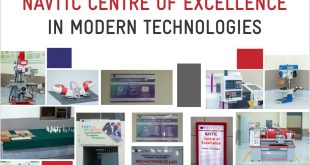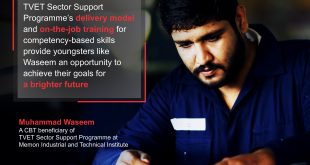Sonia Rafaqat, 28, sits with a Juki machine in front of her and listens keenly to the instructor. Totally oblivious to the presence of an evaluation team standing nearby, she tries to absorb everything she hears. She is completely involved and unflinchingly committed to the lesson in progress.
 Sonia cannot afford to take chances. Married for five years to a scantily paid chauffer and a mother of two, she could either have sat at home and seen her family members suffer at the hands of poverty, or she could have assumed an active role and contributed to their well-being.
Sonia cannot afford to take chances. Married for five years to a scantily paid chauffer and a mother of two, she could either have sat at home and seen her family members suffer at the hands of poverty, or she could have assumed an active role and contributed to their well-being.
She opted for the second role and got admission in a training course for industrial garments stitching (IGS) at the Vocational Training Institute (VTI), LDA Quarters, Walton, Lahore. She is a clear-headed woman who has made her choice and now there is no turning back.
Sonia’s husband has spent only a few years in school and lacks even the basic educational qualification required to get a secure job. She cannot imagine her children living a similar life and hopes to make enough money to fulfill her dreams once she completes the course.
The VTI managed by the Punjab Vocational Training Center (PVTC) has been there for more than a decade but its doors have remained closed for Sonia and others like her because of lack of funding.
This justification was not enough to appease the local Christian community. Quite often the disgruntled locals would throw garbage and empty glass bottles on the VTI premises and obstruct the path leading to its entrance gate.
“The situation changed the day VTI Walton announced IGS classes for male and female members of the Christian community,” says Abdul Majeed, Admission and Placement Officer (APO) at the facility. He says this came as a pleasant surprise to the locals who were left out of the training system.
The much-needed finances had been managed through the Fund for Innovative Training (FIT) initiative of the Technical and Vocational Education and Training (TVET) Reform Support Programme. The programme is a multilateral initiative co-funded by the European Union (EU), the Royal Embassy of Netherlands and the Federal Republic of Germany, being implemented in Pakistan by the German development agency, GIZ.
The international donors’ money has been used, among other things, to purchase modern equipment, upgrade the existing labs, pay stipends to every student, and provide free books and uniforms to those enrolled.
The APO explains that the message was conveyed to the target audience through banners, pamphlets and meetings with the
local pastors and priests – all of whom appreciated the idea. He adds that the church was also used as a platform to convince people to join the institute and benefit from the training courses it offered.
The LDA Quarters is a low-income area inhabited mostly by the Christian community. The level of frustration among residents is high and incidence of drug addiction and gambling are very common. The chances of employment are limited and those lucky enough to be employed do menial jobs.
“Our purpose in launching this industrial garments stitching course here was to increase job prospects for the members of the Christian community,” shares PVTC Deputy Director Shafqat Rehman, who conceived the idea. As the head of PVTC’s Research and Development (R&D) cell, it was he who developed the concept and submitted the project proposal to the donors.Today, he feels proud to be a part of this initiative. Aimed at doing good for a community neglected for ages, the project is worth all the praise. “As are the financers who made it all happen,” he adds.
Industrial garments stitching, as a profession, is in great demand in the area, with industrial units such as Mr Denim, Nishat, Style Textiles and Komfort located not too far away. The  Quaid-e-Azam Industrial Estate (QIE), which houses hundreds of industrial units, also offers immense job opportunities to those passing out from Walton VTI. In fact, they have a competitive edge over others due to their hands-on experience of operating modern stitching machines. While others take weeks to acclimatize to the environment, VTI graduates are on the go from day one.
Quaid-e-Azam Industrial Estate (QIE), which houses hundreds of industrial units, also offers immense job opportunities to those passing out from Walton VTI. In fact, they have a competitive edge over others due to their hands-on experience of operating modern stitching machines. While others take weeks to acclimatize to the environment, VTI graduates are on the go from day one.
It has been observed that the women of the area are more concerned about the well-being of their families and are more willing to assume responsibility. The men on the other hand are easygoing and are quite content to waste their time. They even scoff at the uniform-clad women who head to the VTI early in the morning.
Sajida Akram, a middle-aged woman married for 14 years, is a case in point. Initially, she was ridiculed by the men for days for dressing up like a young girl and carrying books. Sajida did not lose hope and patience and kept on the path she had chosen. Today, the same men who ridiculed her respect her for the positive change she is bringing to her family’s lifestyle.
Asif Saleem, 28, and Imran, 24, are students of the IGS course for males. By engaging in this productive endeavour, they have managed to distance themselves from their former companions who used to indulge in excessive alcohol, drugs, and petty crime. These friends of the past try to lure them back to their old routine, but that, they say, will never happen. “However, it is quite possible that one day we’ll succeed in bringing them to the institute as students,” hopes Imran.
 Pakistan TVET REFORM Support Programme Technical and Vocational Education and Training (TVET) Reform support Programme
Pakistan TVET REFORM Support Programme Technical and Vocational Education and Training (TVET) Reform support Programme









